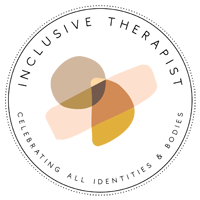Your body is holding so much.
I see you there, feeling that familiar flutter when someone asks for “just one more favor.” I see that tug in your stomach when you realize you’ve spent another entire conversation pouring into them without once mentioning what’s stirring in your own heart. I see how “of course!” tumbles out before you’ve even had a breath to check in with yourself.
If you’ve been walking alongside me in this series, you might be starting to feel how your tiredness runs deeper than just being busy. Maybe you’re beginning to recognize the ache of being disconnected from yourself. Here’s something I want you to know: that people-pleasing you do? It’s not a flaw in your character. It’s your nervous system doing everything it knows how to keep you safe—and it’s been working so hard for so long that it’s forgotten it’s okay to rest.
How People-Pleasing Becomes a Nervous System Response
You know about fight or flight, maybe freeze too. But there’s another response your heart might know intimately: fawn. This is when your nervous system whispers, “The safest thing we can do right now is pour ourselves into making sure everyone else is okay. If we become so helpful, so agreeable, so completely focused on their needs, maybe we’ll be safe. Maybe we’ll be loved.”
Perhaps you learned this dance when you were small. Maybe you grew up in a home where keeping everyone comfortable felt like the most important job in the world. Where conflict made your heart race, where big emotions felt too big to hold, where your worth seemed to live in how much peace you could create for others. Your brilliant, caring nervous system figured out that the most reliable way to feel secure was to become the person who made everything okay for everyone else.
And oh, how well it worked. You kept the peace. People cherished you. You felt needed, treasured, essential. It’s only now, perhaps years later, that you’re feeling the cost of this beautiful, exhausting way of loving.
When Your Body Becomes the Keeper of Your Truth
Your body has been holding the story of every time you’ve set your own heart aside to tend to someone else’s.
In my therapy room, I witness the most caring souls arriving with bodies that are quietly, persistently asking for attention. Unexplained tension that comes in waves. A stomach that seems to hold worry that isn’t even yours. Sleep that dances just out of reach even when your bones ache with tiredness. That constant feeling of being “not quite right” that you can’t name but can’t ignore.
Your nervous system has been keeping a record of every time you said yes when your heart whispered no, every conversation where you disappeared into caretaking, every moment you contorted your beautiful self to keep someone else comfortable. This betrayal of your own inner voice creates a quiet storm inside that your body simply cannot pretend isn’t happening.
The Secret Feelings You’re Afraid to Name
Can we talk about the feelings you think you’re not supposed to have?
You give and give until you’re empty, then feel guilty for hoping someone might give back to you. You bend yourself into impossible shapes for people, then shame yourself for noticing when they don’t even see your effort. You make everyone else’s comfort your priority, then judge yourself harshly for feeling frustrated when your own needs become invisible.
These feelings aren’t proof that you’re selfish—they’re love letters from your authentic self. They’re your true heart trying to break through all that beautiful, exhausting caregiving, desperately trying to remind you: “I’m here too. I matter too. I need tending too.”
But instead of listening to this sacred feedback, you probably tell yourself you’re being selfish and pour even more of yourself out to prove you’re not. The cycle spins: give more, feel more resentful, judge the resentment, give even more to make up for having feelings. Meanwhile, your nervous system grows more overwhelmed, and your body bears the weight of this internal war between who you really are and who you think you need to be.
When Your Heart Becomes Your Prison: Why People-Pleasing Prevents Real Intimacy
Do any of these feel familiar?
“I’ve become so good at reading everyone else that I’ve forgotten how to hear my own voice.”
“I feel guilty just existing in conversations with my own friends.”
“The thought of disappointing someone makes me feel physically sick, even when what they want isn’t fair.”
“I can solve everyone else’s problems but fall apart trying to make simple decisions for myself.”
That people-pleasing that started as your way of staying connected? Over time, it can become the very thing that keeps real intimacy at arm’s length. When you’re always managing everyone else’s emotional weather, when do you ever get to let them see the beautiful storm of your own heart? You become known for what you give rather than who you are.
The irony breaks my heart: in trying so desperately to be loved, you’ve made it nearly impossible for anyone to truly know the real, whole, magnificent you.
What Your Nervous System is Trying to Tell You
That bone-deep exhaustion you carry? The resentment that surprises you with its intensity? That growing ache of losing yourself in all the giving? These aren’t signs you’re broken. They’re your nervous system’s way of saying: “Remember when we talked about coming home to yourself? This people-pleasing—it’s keeping us in exile from our own heart.”
Your body is trying to tell you that the survival strategy that once kept you safe might now be keeping you small. That it’s possible to love others deeply without abandoning yourself. That saying no won’t cause the catastrophe your nervous system keeps preparing for.
This isn’t about becoming selfish or cold. This is about learning to hold yourself with the same devotion you’ve been pouring into everyone else. This is about discovering that boundaries aren’t walls that keep love out—they’re sacred spaces that let real love in.
The Courage to Let Yourself Be Real: How to Stop People-Pleasing and Set Healthy Boundaries
Healing from people-pleasing isn’t about becoming less loving—it’s about becoming whole. It’s about trusting that you can hold other people’s disappointment without breaking, and that they can hold yours too. It’s about believing that relationships built on your authentic self will be infinitely more nourishing than ones built on your endless giving.
Your nervous system learned to fawn as a way to survive, and it was brilliant at keeping you safe when you needed it most. But you’re not that vulnerable person anymore. You have choices now that you didn’t have then. You can learn to recognize when your people-pleasing flows from genuine love versus when it’s driven by that old, familiar fear.
The path forward is about gently teaching your nervous system that it’s safe to say no, safe to have needs, safe to take up the space you were always meant to fill. This happens slowly, with infinite compassion for the part of you that learned that love meant disappearing.













